For Naomi Mdudu, founder and CEO of The Lifestyle Edit, community is everything. As an ex-fashion editor who fell in love with storytelling, she found herself increasingly frustrated that there wasn’t a space to find stories like the ones she was experiencing at work. She spent her days interviewing amazing and inspiring business women, only to have the conversations cut way down in favor of splashy headlines and quick information. She decided to create that space, and in 2015 TLE was born.
TLE is intentional in not only shining a light on the inspirational stories of female entrepreneurs but also digging into the challenges and strategies that could help the community level up.
In this interview, Naomi highlights the power of self-discipline and shares how she creates structure in her life to not only work on her business but also to work on herself. Mdudu believes that entrepreneurship is 20 percent business and 80 percent mindset, and breaks down how she continues to grow as a woman and as a business owner.
Her Agenda: You started your career in fashion?
Naomi Mdudu: I’ve run the gamut in fashion. Originally I was working as a stylist. I was working as an assistant to fashion editors for some of the big magazines and started working with freelance stylists on campaigns. I realized as much as I thought it was about the products, for me, it was really about the storytelling and the writing side. I actually got my first job in the fashion world a week after graduating from college. I became the fashion editor of a financial newspaper in London, and the rest of my corporate career was in newspapers.
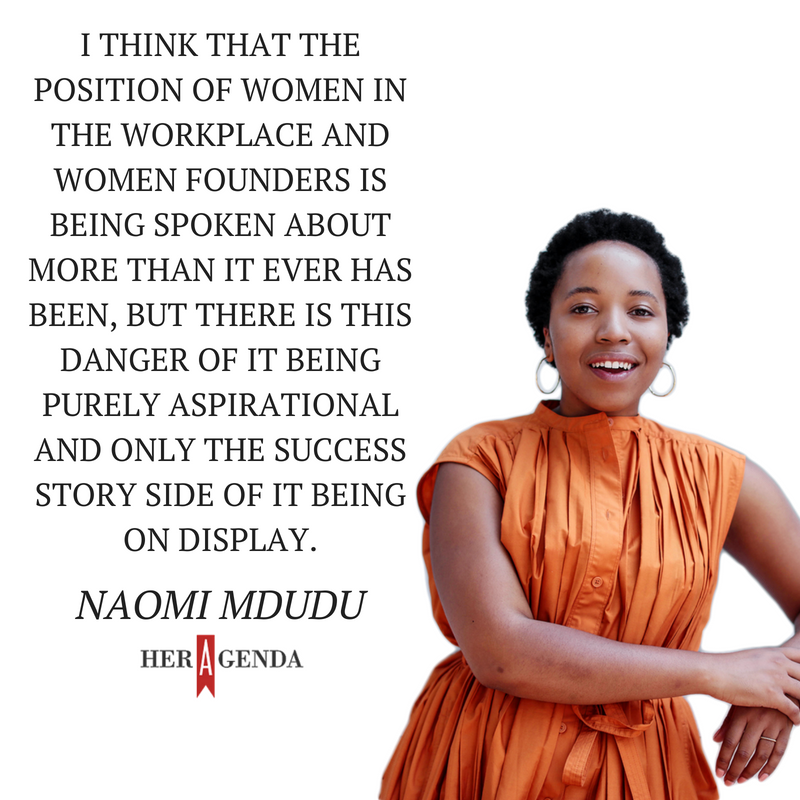
Her Agenda: What inspired The Lifestyle Edit, and what kind of community did you intend to create when you started working on the platform?
Naomi Mdudu: I’ve always been very inspired by storytelling. I was really fortunate in my old job to have the opportunity to interview incredible creatives in the fashion industry; some you may know, and some who were unsung heroes behind the scenes. The publishing industry changed so much over the course of my career working in print, and very quickly the storytelling aspect that I loved about print was disappearing. I got to interview these really incredible women, but my interviews were being condensed down to these very top line articles (with only the facts).
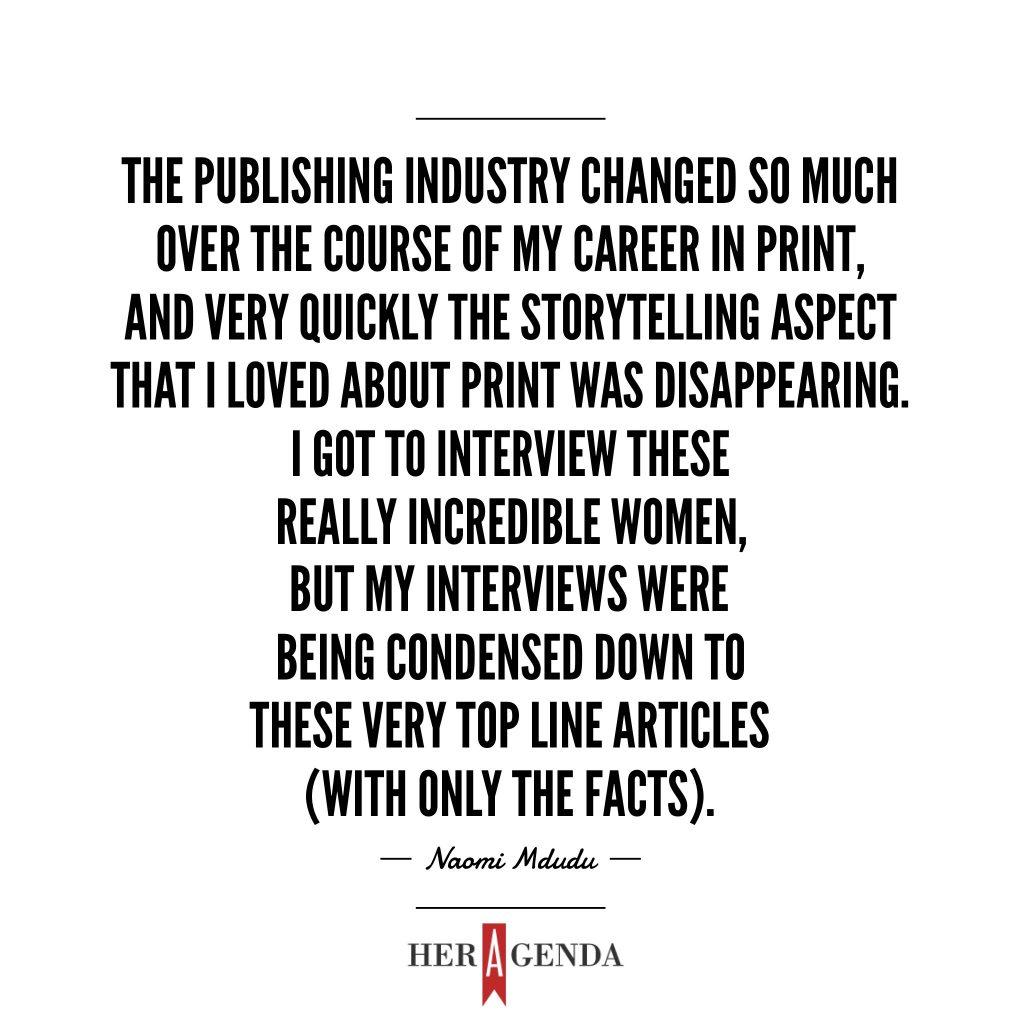
The turning point for me was when I interviewed Tamara Mellon; it was right around the time that her time with Jimmy Choo was coming to an end. We spent a really amazing afternoon together. She’s a marketing genius and is such an incredible business woman, but I wasn’t able to put a lot of the content, and a lot about the amazing conversations that we were having into the article, and that was increasingly becoming the case.
So I started surveying the storytelling space. In the articles that I was used to reading, entrepreneurship wasn’t being covered at all, and when it was, it was either corporate, masculine Forbes style or it was very inspirational but bore no resemblance to my experiences or the experiences of my peers. So I really wanted to bring those conversations that I was having off of the record and create a space for them; for women who would be willing to talk about the opportunities they’ve had in their careers, but also the challenges and how they’ve been able to overcome them. I also wanted a space for women who were willing to talk about the strategies that have worked. I think that the position of women in the workplace and women founders is being spoken about more than it ever has been, but there is this danger of it being purely aspirational and only the success story side of it being on display. So I’m always looking for women who are ready to pass the baton and share those strategies that have helped them to get them where they are.
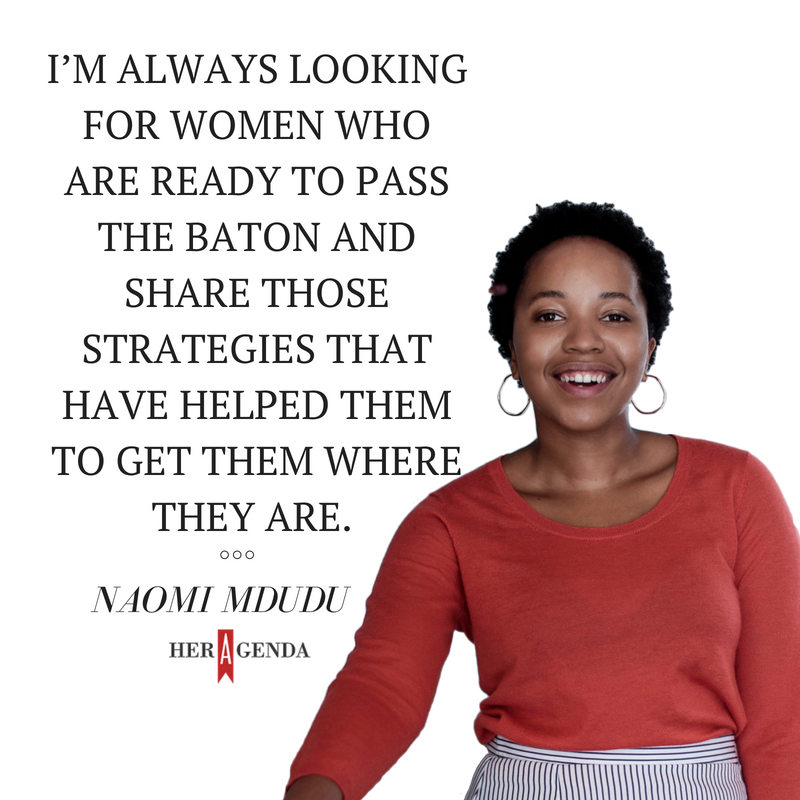
Her Agenda: We’re seeing a lot of really great content around women and entrepreneurship today across the internet, and much of it is around the success stories. What’s been your process for going from aspirational to doing the work to build something?
Naomi Mdudu: First, I really started this business from a place of service. I was frustrated that these conversations that I was having were not in the public domain. Women were not getting access to this type of information, so everything that I’ve done in scaling my business and executing has always come from that service.
My 1 on 1 coaching clients are really the ones that make me show up and execute because I started this business for them, I was hearing their pain points all the time. That’s how we’ve been able to create our business and scale it; every new offering has come from our community.
That’s been a real driver in me showing up because being an entrepreneur is tough; you have those moments where it’s far easier for you to not do it than to continue. I always laugh and say; I love my business, I hate my business, resent my business, am inspired by my business, am challenged by my business, and sometimes I can feel all those emotions in the same day. So having that higher purpose and that why is what really makes me execute.
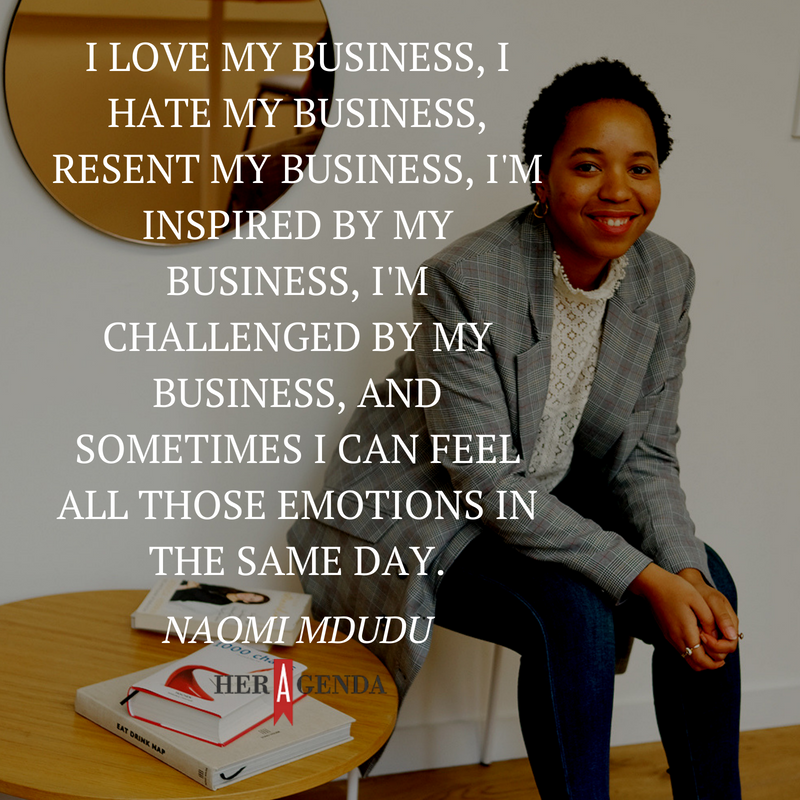
Second, I am a coach, but I actively coach myself every single day. I remember seeing a great Youtube video where a doctor says to a crowd, “Do you believe that your thoughts can create your reality?” and everyone puts their hands up. The second question was, “Well how intentional are you with your thoughts? Do you really take the time to proactively create your thoughts?” All the hands went down. I thought that was so telling.
Especially as entrepreneurs, we need to make sure that we are constantly working on our internal reserves and resources to be able to withstand the challenges that come with running a business. So I’m really intentional about having that white space to make sure that my mind is right.
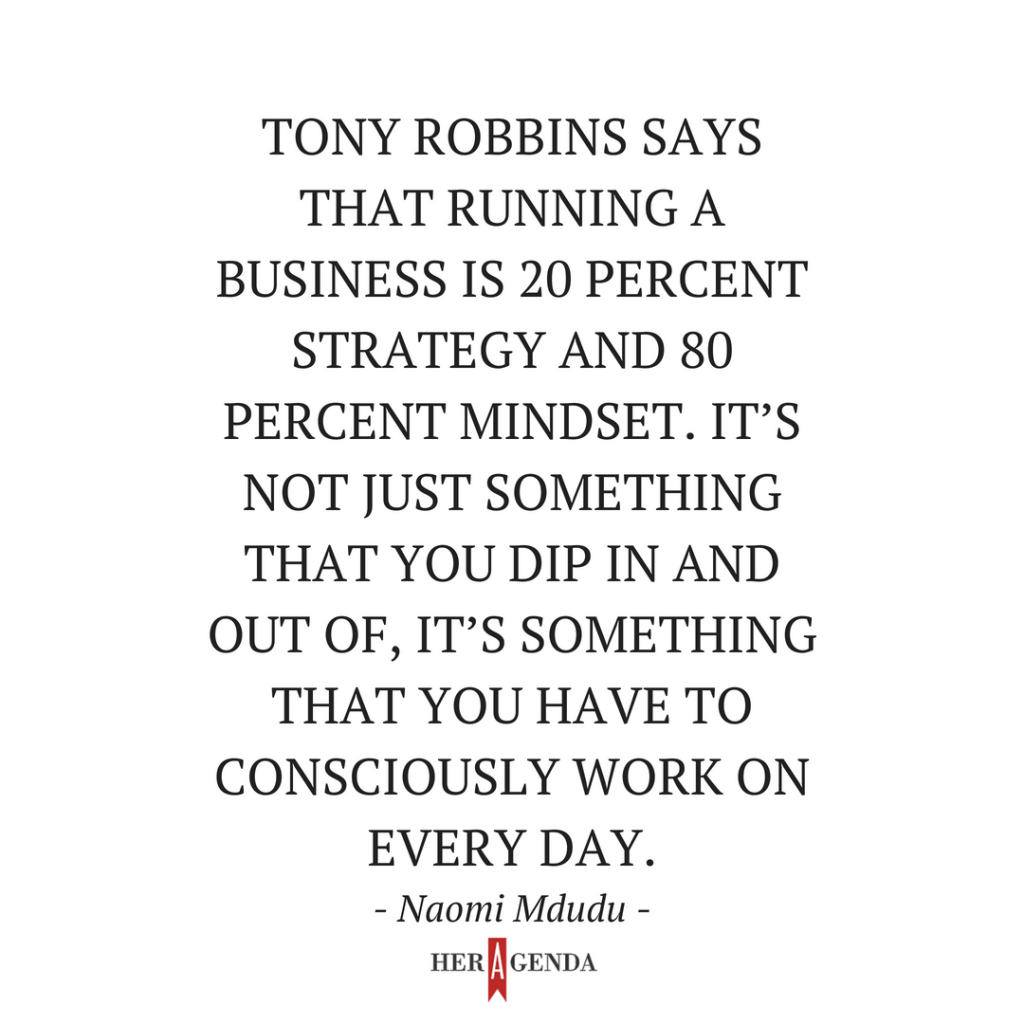
Tony Robbins says that running a business is 20 percent strategy and 80 percent mindset. It’s not just something that you dip in and out of, it’s something that you have to consciously work on every day. It’s the same thing I do with my clients, going from a scarcity mindset into an abundance mindset every time. I think it’s easy for us to think, ‘When I hit this point then things will be easier,’ but every time you hit that next milestone, more of your stuff comes up and different challenges arise, so you need to make sure that your constantly up leveling yourself so that you can rise to the challenge when you hit those milestones.
Her Agenda: What does leveling up look like for you day to day?
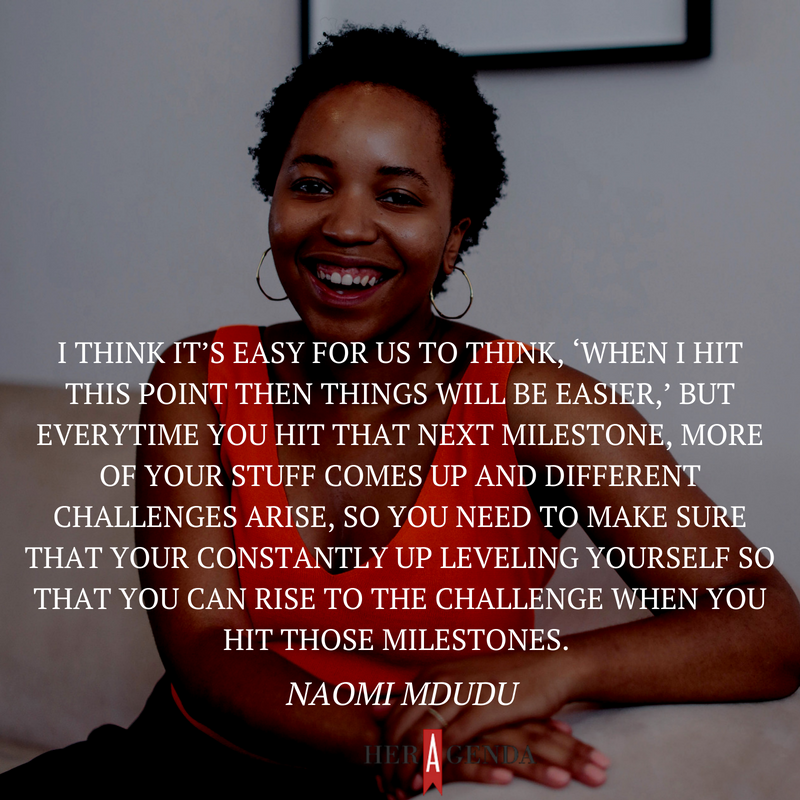
Naomi Mdudu: I have many boundaries for my time. One of the best pieces of advice I got was from a woman namedKristina Karlson, she’s the founder of a stationary brand called kikki.K. I was feeling really overwhelmed and pulled in 101 different places, and I told her, “I don’t really know what to do.” Her advice to me was to write down three things that you could do in a quarter that would really move the needle in your business. Not the, it would be nice to do, but the must-haves. The things that if you were able to nail, it would have a ricochet effect on the rest of your business.
I typically start there and then I’ll break down the details; when do I do my best work and when do I need to work on certain things? I know that I’m at my best on a Monday morning, so that’s when I’m working with my 1 on 1 clients. I no longer take meetings throughout the week. I’m really disciplined, I will only take meetings on a Thursday. Just safeguarding my time; safeguarding whiteboard time, safeguarding creation time, safeguarding time to work on my business rather than working in my business. I know it sounds really regimented, but for me, it enables me to feel more control of everything, also scheduling in that time for myself makes a big difference.
Her Agenda: Working a full-time job vs. starting a business full time; how did you do it, and what are your recommendations for balancing the two?
Naomi Mdudu: I had been working on the idea while I was still in my full-time job, but I pretty much did the bulk of it when I left my full-time job. However, I typically don’t advise people to do that. In not having a source of income when you’re starting your business, you’re putting a lot of pressure on your business to be generating money before you’ve even crystalized certain things. It just puts a certain pressure on you that you don’t need at that early stage.
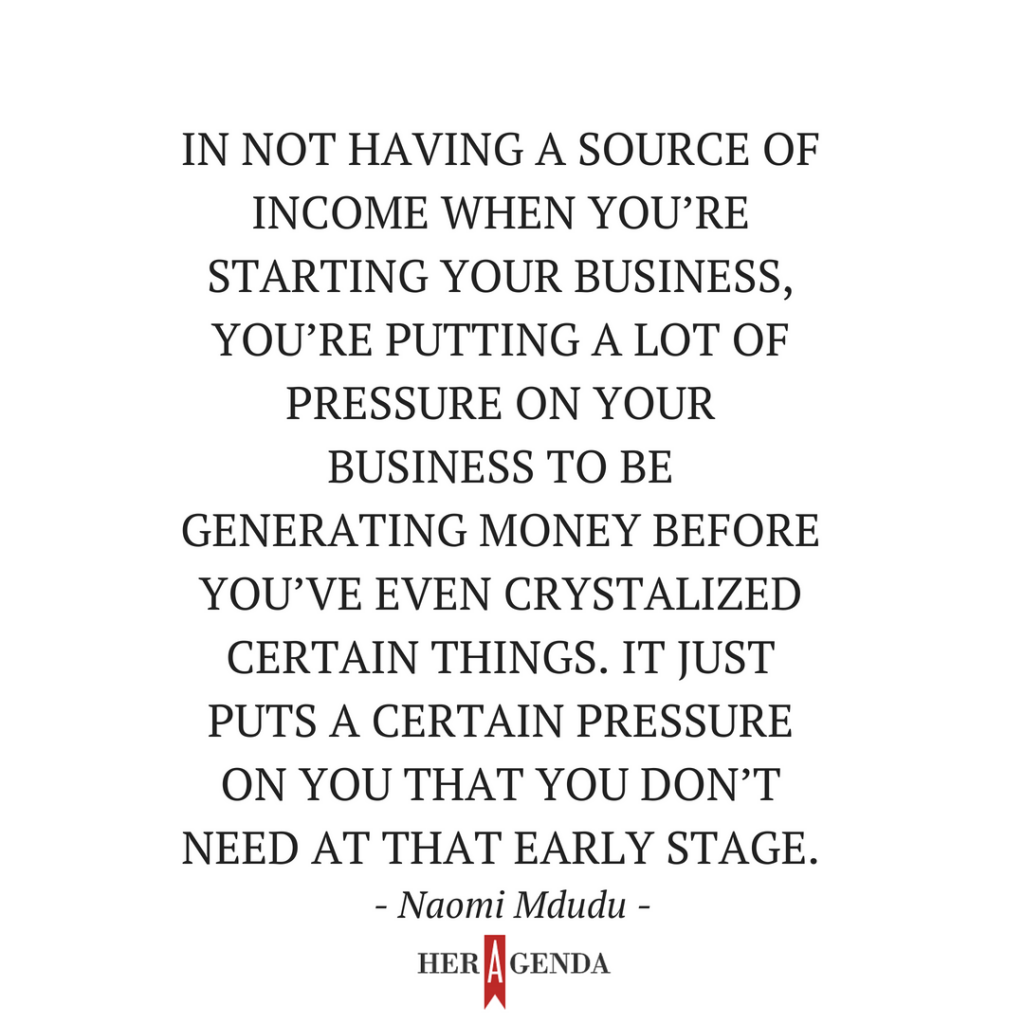
Fortunately for me, I wasn’t starting a business in a field that way completely different from what I was doing. When I was starting my business, I started with TLE studio which is a consulting arm of the business so we were able to generate a healthy cash flow for the business from the beginning. So I didn’t have to take on advertisers, I could keep my content really pure and put that revenue back into the site to really make sure that I could make it how I wanted it to be in those early days, which I think is really important; I wasn’t under pressure with resources. Creating content requires cash and time so that enabled me to do that.
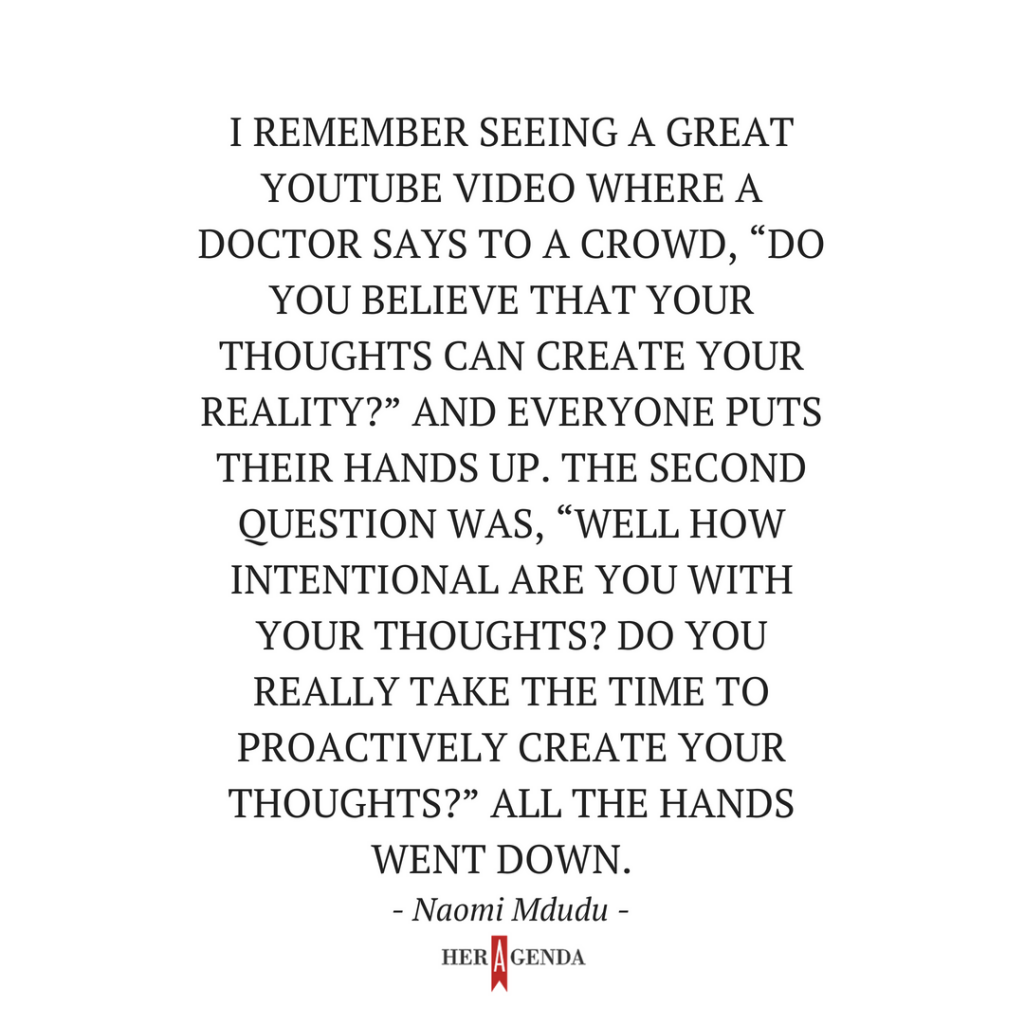
Her Agenda: How can we all stay inspired and as balanced while working a 9-5 and building a business for ourselves simultaneously?
Naomi Mdudu: It’s difficult because It depends on where you’re at, and what season in life you’re in. What you’re able to commit to when your single and have no dependents is very different than if you have a family that you need to be taking care of. There is this tendency to believe that — if you really believe in this business you want to launch, hustle hustle hustle every waking minute of every day, and for some people that doesn’t align with them.
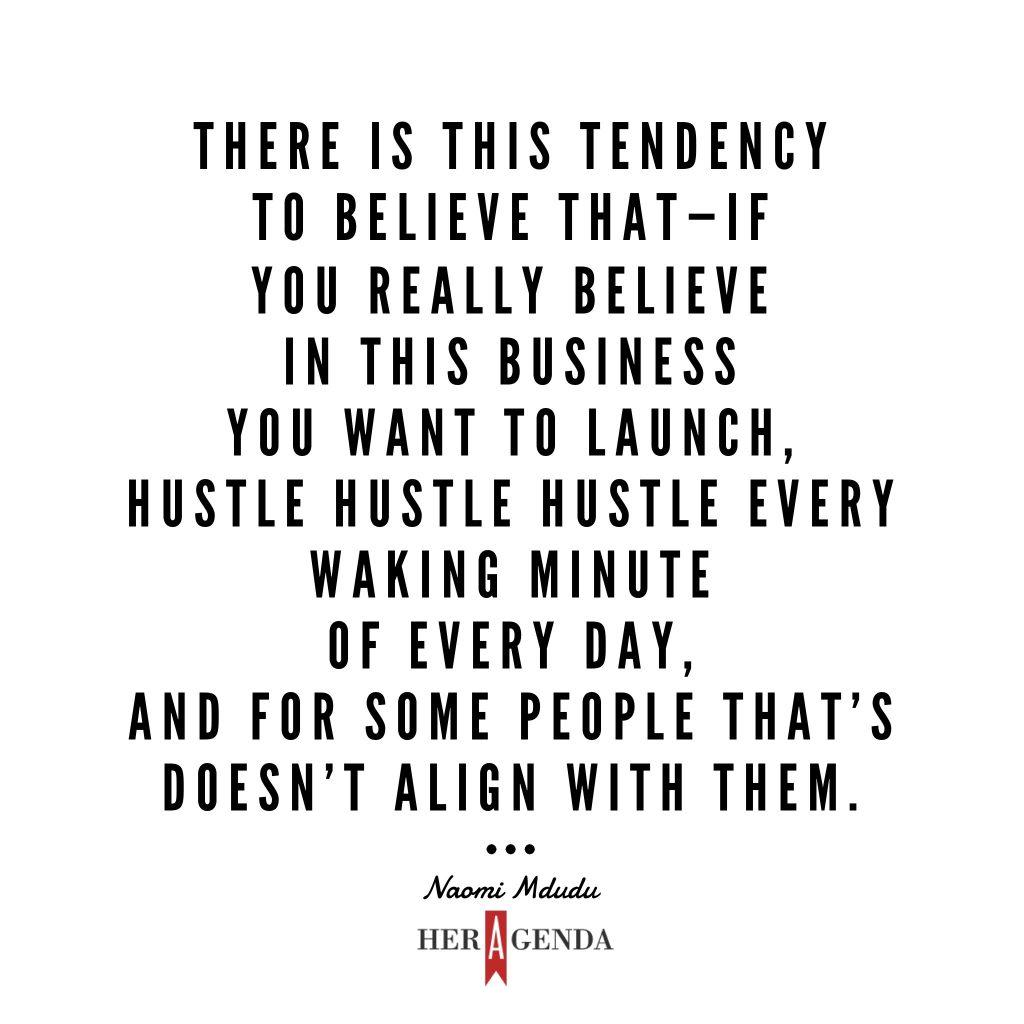
Make sure that you’re doing as much of the testing and fine-tuning when you have an income coming in. I see so many women who are really passionate about a specific product or service, and they really believe in it and have quit their jobs to pursue it, and then say — now I need to find out who my customer is, now I need to find out if there is a market, now I need to figure out if people are willing to pay. That shouldn’t be stuff that you’re doing at this point. It’s all about proof of concept. Get those initial assets that you’ll need to launch while you have a full-time job and you have that money coming in that can support that. Execute in a way that you really want to show up in the world when you’re strapped for cash.
We all have choices; I don’t believe in balance, and we all have seasons. Sometimes it’s just necessary for me to work harder in my business and other times I have more personal time; it’s this kind of cyclical approach. But you have to be willing to make some of those sacrifices in the beginning in order for it to pay off. You have to be present and build that momentum, and there are always going to be other people in your market who are willing to do that.
It’s a great Litman’s test to see if you’re really passionate about an idea. I wasn’t going out on holiday with friends, I made so many sacrifices both time-wise and financially because my business was my baby, I wanted to pump all of my time and resources into making sure that all that it happened. It’s often times hard for other people to take you seriously when you haven’t put in that time and dedication to making your business a reality. So every time when you are giving yourself a get out of jail free card, really think if you’re making a decision that empowers you or that keeps you where you are.
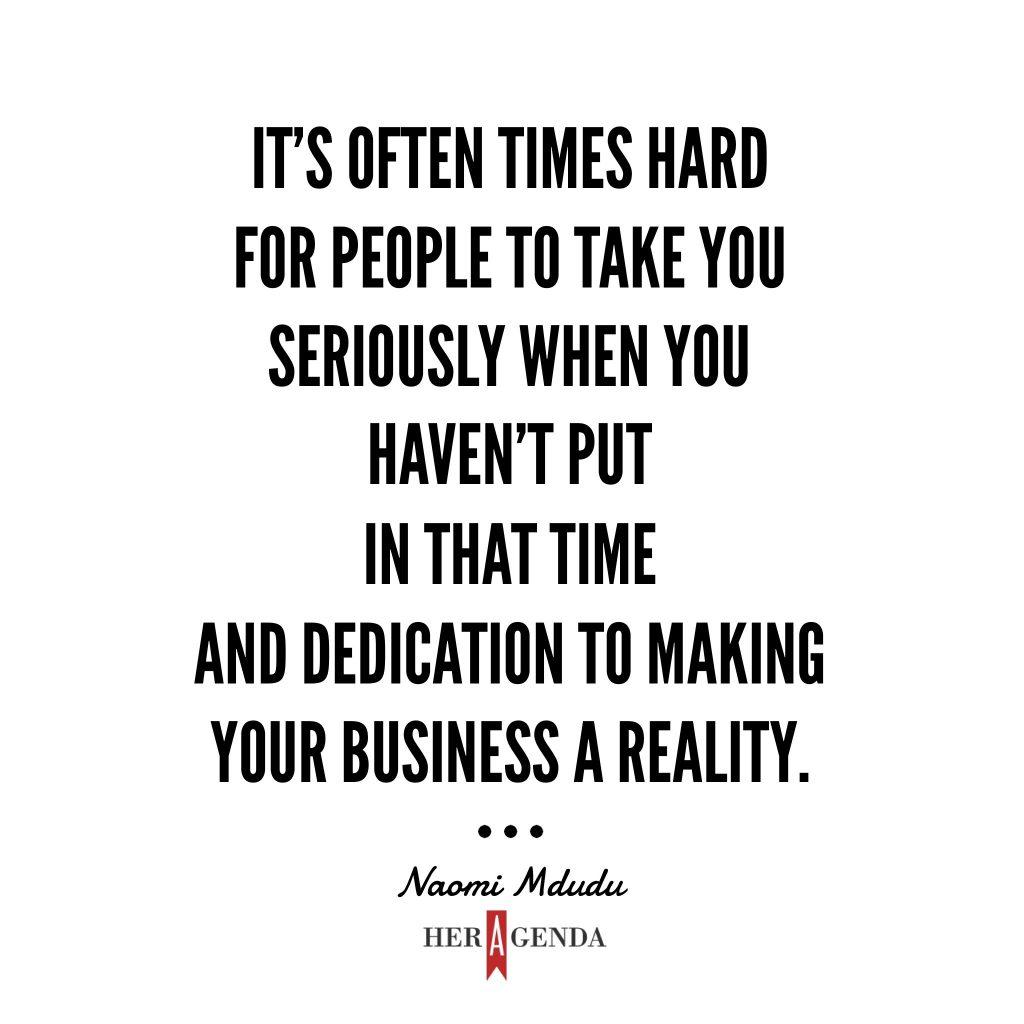
[Editor’s note: This interview was published on August 6th, 2018. It has been edited for length and clarity.]








